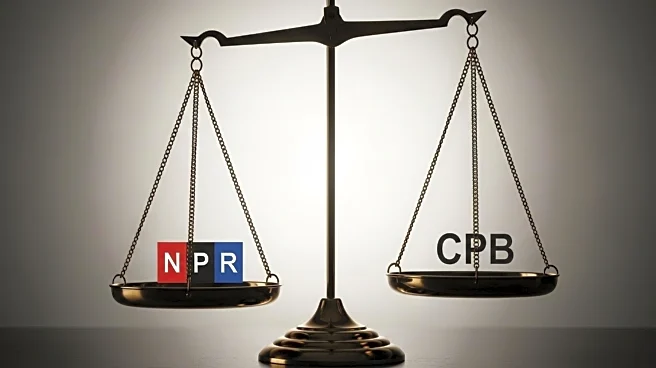What is the story about?
What's Happening?
NPR has filed a legal challenge against the Corporation for Public Broadcasting (CPB) in a federal court in Washington, D.C., seeking to block the transfer of $57.9 million in satellite funding to a newly established nonprofit, Public Media Infrastructure (PMI). This move comes after CPB announced the allocation of funds to PMI, which includes partners like New York Public Radio and American Public Media. NPR argues that CPB's action violates the Public Broadcasting Act, which mandates that satellite interconnection funding should be directed to the national entity designated by public radio stations, traditionally NPR. The dispute arises amidst CPB's impending operational wind-down following President Trump's executive order to halt funding to NPR and PBS, citing biased content. NPR's current grant agreement with CPB is set to expire soon, raising concerns about the recovery of funds once transferred to PMI.
Why It's Important?
The legal battle between NPR and CPB could significantly impact the public radio landscape in the United States. NPR has historically managed the Public Radio Satellite System, a critical infrastructure for public radio distribution. The establishment of PMI and the redirection of funds could challenge NPR's longstanding control over this system. The case also underscores broader issues of government influence on media funding, with NPR asserting that CPB's actions represent viewpoint discrimination and a violation of First Amendment principles. The outcome of this case could set a precedent for how public media funding is allocated and managed, potentially affecting the operational capabilities and editorial independence of public radio stations nationwide.
What's Next?
U.S. District Judge Randolph D. Moss is set to hear NPR's case against the government. The court's decision will determine whether CPB can proceed with its funding transfer to PMI or if NPR will retain control over the satellite funds. As CPB winds down operations, the urgency of the case is heightened, with NPR's current grant agreement expiring soon. The legal proceedings will likely involve further arguments about the interpretation of the Public Broadcasting Act and the implications of President Trump's executive order. Stakeholders in the public media sector, including NPR and PMI, will be closely monitoring the case's developments, as the outcome could reshape funding dynamics and operational structures within the industry.
Beyond the Headlines
The dispute between NPR and CPB highlights the complex interplay between government policy and media operations. The case raises ethical questions about the role of government in influencing media content and funding based on perceived bias. It also reflects broader cultural and political tensions surrounding media freedom and the safeguarding of editorial independence. As public media organizations navigate these challenges, the case could prompt discussions about the future of public broadcasting in the U.S., including potential reforms to ensure equitable funding distribution and protect against political interference.

















